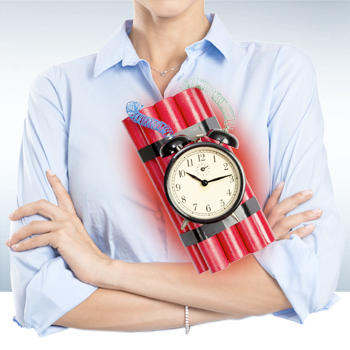
Inferior Vena Cava (IVC) filters are supposed to prevent fatal blood clots, not turn into ticking time bombs in patient’s bodies. But many have become just that. The number of lawsuits is growing. Patients severely hurt by these filters, like Wendy Kopeck, are demanding that manufacturers be held accountable.
Wendy was implanted with a Cook IVC filter in 2013, when doctors determined she was at short-term high risk for a blood clot in her lungs. The filter is placed in the inferior vena cava, the main vein that returns blood from the legs back to the heart and lungs. The device’s spider-like appendages are designed to hold the device in place and to trap any clots before they get to the lungs.
The filter is meant to be temporary. But, when Wendy went in to have the filter removed, her doctor found the device had “fractured,” and one of its pieces had penetrated her jugular vein. The rest of the device had migrated to her small intestines. Removing the debris, her doctor said, would be too risky. She now must live with the possibility that at any moment, a piece of the debris will move to her heart, possibly killing her. She will have to be on anticoagulants the rest of her life.
Wendy is a class representative in one of two class action lawsuits against Cook Medical filed in Canada. The lawsuits allege Cook failed to warn of the filter’s dangerous risks.
Risks and Symptoms of Retrievable IVC Filter Failure
If pieces of the IVC filter break and move to the heart or lungs, symptoms may include:
- Chest Pain
- Confusion
- Heart Rhythm Problems
- Hypotension
- Lightheadedness
- Nausea
- Neck Pain
- Shortness of Breath
- Hemorrhaging or Internal Bleeding
In severe cases, injuries can lead to:
- Death
- Hemorrhaging (severe bleeding)
- Pulmonary Embolism
- Stroke
U.S. Lawsuits Target Multiple Companies and Filters
Here in the U.S., multiple lawsuits also have been filed against IVC filter manufacturers alleging the devices have caused serious injuries and deaths.
These IVC manufacturers and their filters include:
- The Bard Recovery filter
- The Bard G2 filter
- The Bard G2 Express filter
- The Bard Recovery filter
- The Cook Gunther Tulip filter
- The Cook Celect filter
- The Boston Scientific Greenfield IVC filter
Among the lawsuit allegations are failure to warn, design defects, manufacturing defects, breach of implied warranty, negligence and false marketing on the part of the companies and their subsidiaries.
FDA Needs to Recall Dangerous Devices
Despite all the evidence that these filters have an unacceptable rate of failure, the FDA has yet to recall any of them. However, the FDA has issued two safety alerts about IVC filters, and recommends that an IVC filters be used only temporarily if a patient is unable to take anticoagulant (blood clot) medication. The FDA also recommends that patients who have received an IVC Filter talk with their physicians as soon as possible to make sure it has not moved or broken apart, and whether the device should now be removed.
This is not enough. The FDA should recall these unacceptably risky medical devices. This often has the effect of inspiring manufacturers to conduct clinical trials to assess their products for unacceptable risks and to come up with safer designs. Barring that, lawsuits often are the fastest way to get manufactures to pull dangerous devices from the market and prevent further harm. Janet, Janet & Suggs is accepting clients seriously hurt by an IVC filter. IVC filter injury victims have the civil justice system behind them should they wish to hold the makers of unacceptably risky medical devices accountable.
RELATED POSTS
Zimmer Biomet Reverse Shoulder Lawsuit
